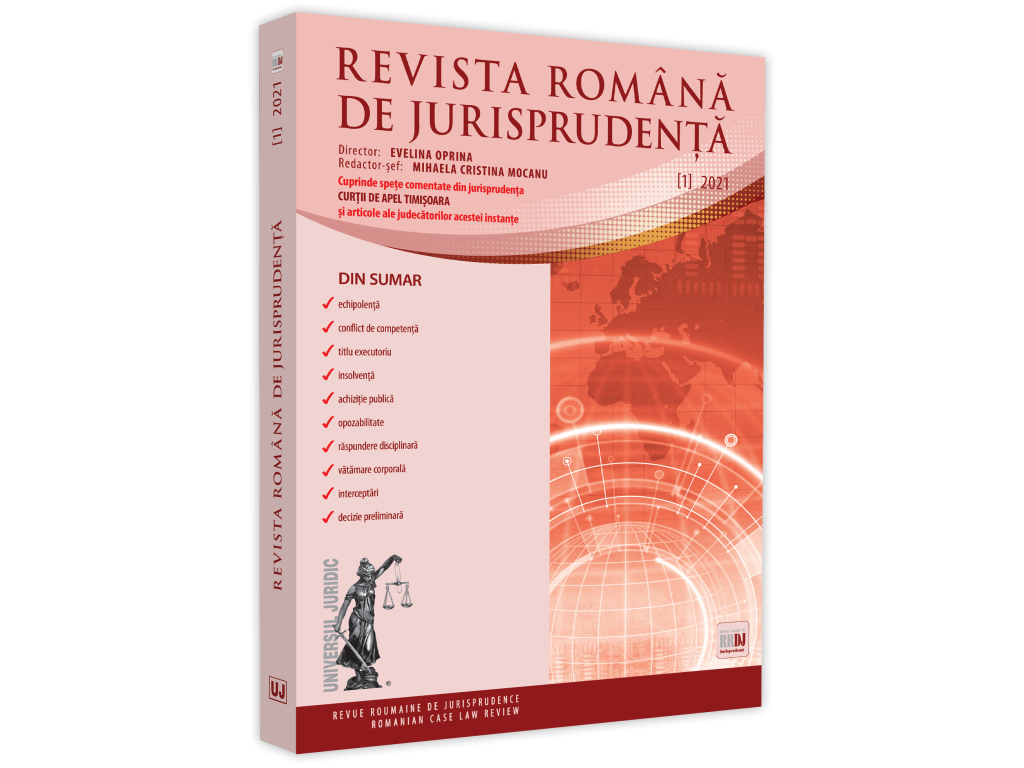40. Ore suplimentare nesolicitate de angajator. Necontestarea deciziei de desfacere disciplinară a contractului individual de muncă
40. Overtime not requested by the employer. Not contesting the decision of disciplinary dissolution of the individual employment agreement
Author(s): Alina Ştefania RotunaSubject(s): Law, Constitution, Jurisprudence, Civil Law
Published by: Universul Juridic
Keywords: overtime not requested by the employer; disciplinary dissolution of the individual employment agreement; Labor Code;
Summary/Abstract: The flexible organization of working time is allowed within the individualized work schedule laid down in Article 118 of the Labor Code, but even this type of program presupposes a daily presence at work, the employee having the freedom to choose the hours of arrival and departure, provided that the daily working time is observed. Carrying out work according to a flexible schedule does not per se remove the applicability of the legal provisions regarding overtime. But, the overtime can be provided only at the request of the employer, according to Article 121 paragraph (1) of the Labor Code, which does not necessarily have to be express, but must be unequivocal. The fact that the employer accepts the possibility for his employee to carry out overtime does not constitute, by itself, a 'request' to perform it, within the meaning of Article 121 of the Labor Code. The provisions of Article 121 of the Labor Code unequivocally show that the employer must have the initiative to provide overtime. The employer's expression of will must be the trigger for the performance of overtime in the managed entity since the employer is the only one able to assess whether it is appropriate for work within such unit to be performed as overtime. It is all the more necessary to have the employer's request for overtime as the employer is will pay for the remuneration, in addition to the salary. A provision such as that in the addendum to the individual employment agreement in the sense that the employee is required to comply with the maximum duration of the daily working time of 12 hours and the average working time of 48 hours per week within the reference period of 4 months, in no case could be assimilated to a request for overtime and it is only intended to set the temporal coordinates in which the plaintiff must carry out its activity within the individualized work program regulated by Article 118 of the Labor Code, which implies the possibility for the employee of flexible organization of the working time. The Court finds that the evidentiary power of the decision to disciplinary sanction of the respondent for finding a lack of management cannot be denied, as long as in both forms of legal liability, both patrimonial and disciplinary, one and the same wrongful act is analyzed. Disciplinary liability and patrimonial liability may coexist in the person of the same employee for committing the same wrongdoing and the particularities between the two legal institutions appear in point of the conditions necessary to trigger liability, especially in terms of damaged social values. In the case of the first form of liability, the harmful result consists in disturbing the work discipline, while the negative modification of the employer's patrimony is the essence of the patrimonial liability. In this context, the causal link is also doubled, it relates the unique, indivisible deed of the person guilty of two harmful consequences, on two different levels. In this respect, it can be considered that by such disciplinary sanction decision, which was not contested by the respondent in the procedure provided by law, and the employer proved having transmitted the decision by postal receipt signed by the respondent, the appellant company proved, in conjunction with other documents produced in the case, of the illicit deed committed by the respondent, remaining to be analyzed the damage caused, respectively the manner in which the patrimonial asset was diminished as a result of committing the illicit deed of the respondent employee.
Journal: Revista Română de Jurisprudenţă
- Issue Year: 2021
- Issue No: 01
- Page Range: 265-277
- Page Count: 13
- Language: Romanian
- Content File-PDF

